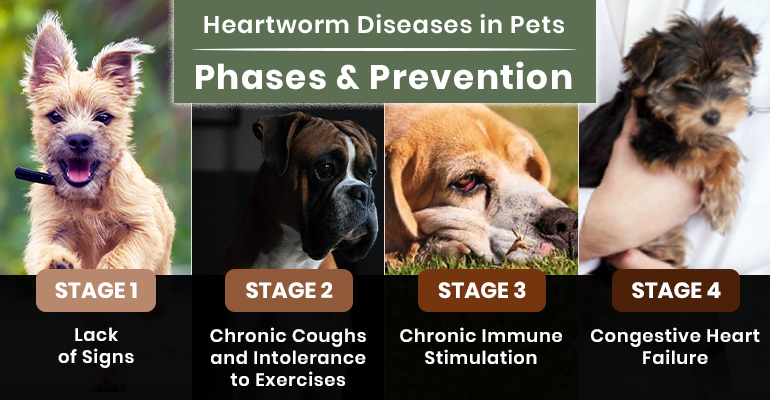Heartworm Diseases in Pets: Phases and Prevention
Heartworm disease is a serious disease that leads to severe conditions like heart failure and other organ damage. If left untreated, it can culminate into a fatal condition, especially in dogs, cats, and ferrets. The longer you take to get it treated, the more difficult it would be to get rid of it. Not only is the treatment costly, but it is also very uncomfortable for your pet. Due to this, prevention becomes all the more crucial. In this article, we will learn about the different stages of heartworm disease in our pets.
4 Phases of Heartworm Disease in Dogs
The symptoms of heartworm disease bifurcate into four phases. You must know that the individual stages are not always visible, and there might be times when two stages overlap. However, this article aims to help you educate yourself about the four major phases and accompanying symptoms.
- Stage One: Lack of Signs
The first stage of the heartworm disease is typically asymptomatic. The heartworms are present and start settling in the heart during this stage. However, the disease has not yet reached the point where the heartworms have begun reproducing. In this period, the dog’s body has not produced enough antigens in an amount sufficient for detection.
Despite being an asymptomatic stage, the damage to the artery already begins. The longer the infection persists untreated, the more likely your pet is; to start displaying symptoms.
- Stage Two: Chronic Coughs and Intolerance to Exercises
As your pet reaches stage two of heartworm disease, symptoms like chronic coughing and intolerance appear. It is because by this stage it is difficult for the lungs to oxygenate blood. Due to abnormal clotting in the lungs, nose bleeds might occur. The parasite infiltration and excessive inflammation in the lungs might result in non-infectious pneumonia.
By this time, your pet’s body starts producing antibodies. There’s also a possibility that by this time, the adult heartworms will start producing microfilariae. The blood tests at this stage can detect the presence of heartworm disease.
- Stage Three: Chronic Immune Stimulation
By the third stage, the disease starts severely impacting your pet’s body, and you can easily notice symptoms. The chronic coughs get severe and may consist of blood too. Your pet would be reluctant to exercise and may get exhausted easily. By this stage, they will start having trouble breathing. The worms in the heart and large vessels will now be quite evident on X-rays.
Since it’s been a long time now your pet has gone without heartworm treatment, chronic immune stimulation occurs. While antibodies play a crucial role in the body’s response to immune challenges, it also produces inflammatory proteins. Since the presence of heartworms chronically stimulated antibodies, they keep producing large quantities of these inflammatory proteins at all times. These proteins result in major tissue damage in delicate parts including the eyes, kidneys, joints, and blood vessels.
- Stage Four: Congestive Heart Failure
The inflammation of arteries and heartworms plugging the blood vessels makes it difficult for the heart to pump blood through. The heart would need to work harder and drastically improve its efficiency, which it might not be able to do. As a result of the right side of the heart being weak, fluid accumulation in the chest and abdominal cavities will occur. This will also disrupt normal electrical impulses and would lead to arrhythmias.
By this stage, your pet falls very ill. Along with evidently visible symptoms, the disease has reached a level where even with treatment, the risk of long-term debilitation and possible death is high.
Explore more Regarding : How to Recognize Heartworms in Dogs?
Cats and Heartworm Diseases: Indications
The immune systems of cats are far more sensitive to the inflammatory proteins that the antibodies produce during the presence of heartworms. More signs of lung diseases, respiratory distress, and chronic coughing or vomiting. Often, we misdiagnose feline heartworm disease as feline asthma, which makes it even more difficult to offer treatment at the right time. The inflammation’s effect can be noticed far beyond the lungs and circulatory systems. Just like dogs, cats may also suffer from sudden death due to heartworm disease.
End Note: Preventive Measures
Even though Heartworm disease is a potentially fatal disease, it also comes under one of the highly preventable ones. An owned pet suffering from heartworm disease and dying is probably one of the most unfortunate things that can occur. You can easily get heartworm preventives. These are highly effective formulas, are available at reasonable prices, and are safe to use.
Read More About : Why Heartworm Prevention is So Important?
Try Heartgard Plus, an efficient heartworm preventive that you can easily administer due to its palatable nature.
With so many preventive options readily available in the market online and at physical stores, there is no excuse for the owned pets suffering from heartworm disease. Order the preventives now, and keep your furry little friends safe and healthy. Also, never ignore any abnormal sign by your pet, no matter how minute it seems.




